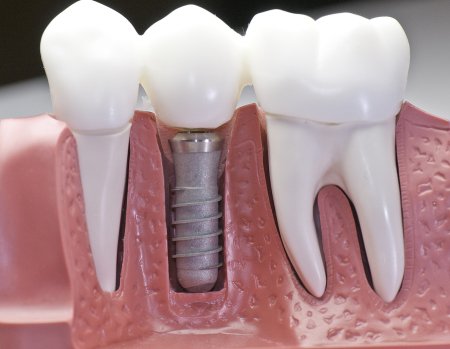-
A Closer Look at Tongue-Tie
Tongue-tie is a congenital condition that affects the range of motion of the tongue. In patients with this condition, the tongue is “tied” to the bottom of the mouth by an extra band of tissue, which can affect the ability to eat, speak, and swallow. At Glenwood Premier Dental, our dentists can use Waterlase Dentistry to treat tongue-tie and prevent many of the secondary conditions and concerns it may cause.

Causes and Symptoms of Tongue-Tie
Tongue-tie occurs when the lingual frenulum, a small fold of tissue beneath the tongue, fails to separate from the bottom of the mouth prior to birth. The causes of this congenital condition are unknown. Symptoms of the condition include difficultly raising the tongue or moving it side to side, trouble sticking out the tongue, and a tongue that appears heart-shaped when raised.
Complications of Tongue-Tie
Tongue-tie can cause complications that affect an individual’s ability to eat, swallow, or speak naturally. Infants in particular may have trouble eating, especially when breastfeeding. Children with tongue-tie often have difficulty speaking clearly and may suffer from speech impediments associated with a lack of movement in the tongue.
Treatment for Tongue-Tie
In mild cases, tongue-tie may not require treatment at all if the band of tissue does not excessively restrict the tongue or its motion. However, individuals with symptoms that interfere with eating or speaking can benefit from treatment. Your dentist can treat tongue-tie using laser dentistry techniques to quickly and cleanly cut the band of tissue holding the tongue in place. This procedure is short, safe, and painless, allowing the tongue to immediately move freely to eliminate the symptoms of and complications associated with tongue-tie.
Would you like to learn more about treatment for tongue-tie and laser dentistry near Hazlet? Please call Glenwood Premier Dental at (732) 264-4477 or visit our website to schedule an exam with an experienced dentist on our team. We will be happy to help you explore your short- and long-term dental needs, from dental exams and teeth cleaning to restorative care and implant dentistry.
-
What Is Osseointegration?
Implant dentistry is often performed in several different stages to ensure that the patient receives a permanent and comfortable result. After your initial implant procedure, your dentist may ask that you schedule a follow-up procedure in six months. During the six-month window, a process called osseointegration will occur. Osseointegration can be literally translated to “bone connection.” After the implants have been put into your jaw, the process of osseointegration will allow them to become a permanent part of your smile. Before your dental implant procedure is completed, your dentist will make sure that osseointegration has taken place.

When you are seeking a top rated dentist serving Hazlet, contact Glenwood Premier Dental to learn more about our restorative care services. We are consistently ranked among the best dentists in the area, and Dr. Wassef can provide you with the right services for your smile. Give our office a call at (732) 264-4477 to make your next dental appointment.
-
Who Needs Antibiotics Before Dental Treatment?
If you have a heart condition, it may be necessary to take an antibiotic before you make a trip to the dentist. In this video, you will learn about who needs to take antibiotics in preparation for a dental procedure. Those patients who have artificial heart valves or certain forms of congenital heart disease may need to take a course of antibiotics before they receive dental care.
From teeth polishing to dental exams and more, the team at Glenwood Premier Dental will be there to provide you with all types of procedures. In the event that you need an emergency dentist near Hazlet , you can trust your dental care with our professionals. Give us a call at (732) 264-4477 to set up a preventative dental exam today.
-
Preparing for Your Root Canal
If your dentist has recommended that you receive a root canal on one or more teeth, you will need to take all of the steps necessary to prepare for the procedure. While you may feel nervous in the days leading up to your root canal, it is important to know that your dentist will make sure that you are completely comfortable before, during, and after the procedure. Here are some top tips to help you prepare for your root canal.

Ask Questions
Asking questions will help ease any anxiety that you may feel about your root canal treatment. Your dentist will be happy to provide you with information about the root canal process, as well as what you can expect from your recovery. Rather than wondering and worrying, you can ease your mind by gathering accurate information from your dentist.
Follow Instructions
Your dentist may provide you with specific instructions to follow in the days and night leading up to your treatment. Depending on your past medical and dental history, you may be asked to take an antibiotic before your root canal is performed. It may also be necessary to abstain from eating and drinking the night before your root canal.
Plan for Recovery
One of the most important steps of preparing for a root canal is to prepare for your recovery. If you will be anesthetized during the procedure, you will want to make sure that a friend or family member is there to drive you home. It may also be a good idea to take a day or two off of work so that you have time to heal after the procedure.
If you are experiencing tooth pain or discomfort, do not hesitate to contact Glenwood Premier Dental by calling (732) 264-4477. Dr. Wassef will be happy to provide you with quality dental exams in Hazlet, and we also offer a full range of emergency services. Our team looks forward to helping you maintain a healthy smile.
